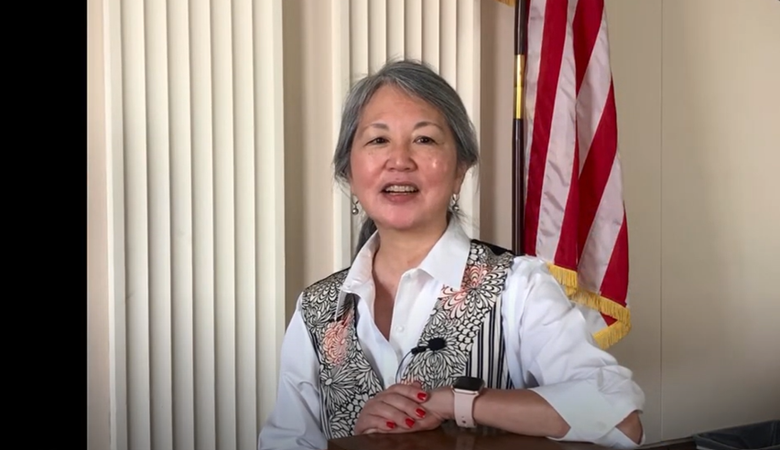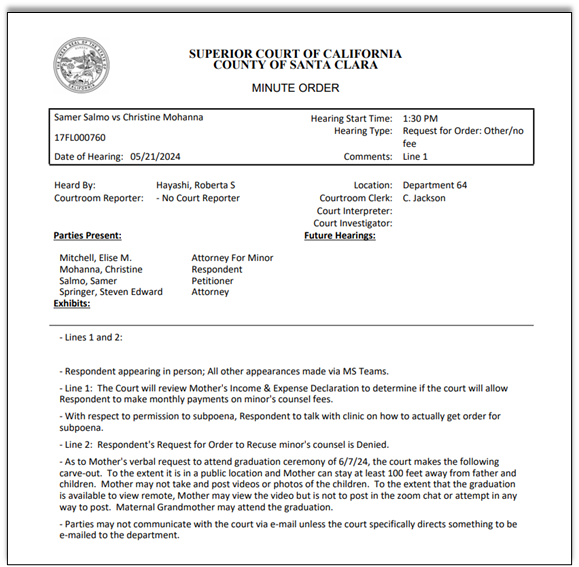

By Fred Johnson and Susan Bassi
When Christine attends her daughter’s San Jose elementary school graduation next month, she could be arrested and criminally prosecuted if she hugs, speaks to, or takes her child’s photograph, according to a court order.
Santa Clara Superior Court Judge Roberta Hayashi issued the order after denying Christine’s request to remove attorney Elise Mitchell from a divorce case filed in 2017. Mitchell was court-appointed to represent Christine’s child during the drawn-out legal proceedings.
According to court documents, Christine alleged Mitchell favored the father in the case, who has sole temporary legal and physical custody of the couple’s child. Christine  contends Mitchell’s involvement in the case has served to incite the conflict and drive-up ligation costs.
contends Mitchell’s involvement in the case has served to incite the conflict and drive-up ligation costs.
Christine is representing herself in the proceedings because she cannot afford to pay for her own lawyer, and a lawyer for her child. Court orders permit Christine to see her child only a few hours a month under professionally supervised visitation.
Additionally, Christine claims Mitchell has acted with bias, resulting in not just a breakdown of her relationship with her child, but also of the child’s relationship with her maternal grandmother.
Now, based on the recommendations made by Elise Mitchell, a family court judge has prohibited Christine from taking her child’s photo at a public school graduation.
Graduation Without Photographs
Judge Hayashi’s May 21 order permits the child’s grandmother to attend the graduation, though it is unclear why any grandparent needs the permission of a family court judge to attend their grandchild’s graduation.

While the order allows Christine and the child’s grandmother to attend the elementary school graduation, it prohibits Christine from taking photos of her child participating in the ceremony.
A judge’s order carries the full weight and effect of the law. Should Christine snap photos of her child’s graduation, she could be criminally prosecuted for violating a court order.
Generational Harm and Family Court Judge Controversies
Judge Hayashi, a Japanese American, has publicly shared the story of her father’s imprisonment in a Japanese internment camp. She has also noted the struggles associated with having grandparents barred from becoming U.S. citizens because they came from Japan.
Lexi Logan, a court observer who witnessed the hearing on May 21, 2024, told the Vanguard that the judge’s decision felt like extreme government overreach and is outright cruel, if not unconstitutional.
“It is more than bizarre that a family court judge who claims to understand the generational impact of government overreach would order that a mother could not take photos of her own child’s elementary school graduation.”
Logan pointed out that the child’s school is public and would have parents and grandparents taking photos of all the children, including Christine’s child, during the graduation ceremony.
“In criminalizing photography of a child’s important milestones, the judge was out of line,” Logan told the Vanguard. “The judge said she was making the order in the child’s best interest, but how is it in any child’s best interest to deter parents and grandparents from celebrating educational milestones simply because parents engage in a divorce?”
Judge Hayashi Media Controversies
Judge Hayashi was a longtime member of the secret Bench-Bar-Media-Police Committee (BBMP), which was shuttered in 2023 after it was exposed by the Vanguard’s extensive reporting.
During the pandemic, the Los Angeles Times reported that, while Judge Hayashi presided over a civil trial, an insurance adjuster was caught in a hot mic moment calling Judge Hayashi an “idiot.”
In a family law case filed in Nevada, Judge Hayashi was captured on video demanding a custody case involving divorce attorney Christina Adames be sent back to Santa Clara, despite the children being enrolled in Nevada schools for nearly a year based on their parents’ agreement.
Family court judges often justify orders and appointments of minors’ counsel, claiming they are acting in the best interest of children. However, issuing orders that prohibit parents from taking photos of their children at graduation, or using judicial power to pull children out of school in connection with their parents’ legal disputes, leaves the public questioning how public court judges determine the “best interests of children” in a modern family court case.





